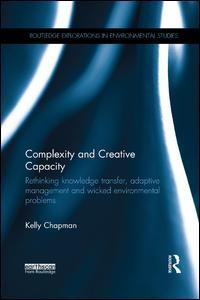Complexity and Creative Capacity Rethinking knowledge transfer, adaptive management and wicked environmental problems Routledge Explorations in Environmental Studies Series
Auteur : Chapman Kelly

Complexity theories gained prominence in the 1990s with a focus on self-organising and complex adaptive systems. Since then, complexity theory has become one of the fastest growing topics in both the natural and social sciences, and touted as a revolutionary way of understanding the behaviour of complex systems.
This book uses complexity theory to surface and challenge the deeply held cultural assumptions that shape how we think about reality and knowledge. In doing so it shows how our traditional approaches to generating and applying knowledge may be paradoxically exacerbating some of the ?wicked? environmental problems we are currently facing. The author proposes an innovative and compelling argument for rejecting old constructs of knowledge transfer, adaptive management and adaptive capacity. The book also presents a distinctively coherent and comprehensive synthesis of cognition, learning, knowledge and organizing from a complexity perspective. It concludes with a reconceptualization of the problem of knowledge transfer from a complexity perspective, proposing the concept of creative capacity as an alternative to adaptive capacity as a measure of resilience in socio-ecological systems.
Although written from an environmental management perspective, it is relevant to the broader natural sciences and to a range of other disciplines, including knowledge management, organizational learning, organizational management, and the philosophy of science.
1. Introduction 2. Unearthing Assumptions: The Co-evolution of Western Science and Philosophy 3. Unravelling Paradox: Mathematical Logic and Orders of Change 4. Filling the ‘Hole’: Non-linearity, Chaos and Complex Self-organising Systems 5. Complexity and Creative Capacity: From a Newtonian to a Complexity Reality 6. Through the Complexity Lens: Cognition, Learning and Organising 7. Implications: Rethinking Science, Knowledge Transfer and Adaptive Management
Kelly Chapman is a consultant environmental scientist, based in Calgary, Canada. She has a PhD from Edith Cowan University in Western Australia and more than twenty years of practical experience in environmental management and planning, environmental communications, and biophysical projects in Africa, Australia and Canada.
Date de parution : 12-2017
15.6x23.4 cm
Date de parution : 11-2015
15.6x23.4 cm
Thème de Complexity and Creative Capacity :
Mots-clés :
Newtonian Paradigm; newtonian; Circular Organisation; paradigm; Complex Responsive Processing; incompleteness; Non-linear Thermodynamics; theorem; Downward Causation; downward; Knowledge Transfer Efforts; causation; Adaptive Management; logical; Higher Order Patterns; types; Vice Versa; self-organising; Logical Types; systems; Adaptive Capacity; Knowledge Transfer; Upward Causation; NK Model; Strange Attractors; Torus Attractor; Phase Space; Benard Cells; Complexity Researchers; Limit Cycle; Wicked Environmental Problems; Double Loop Learning; Autopoietic Unit; Stacey 1996a; Santiago Theory



